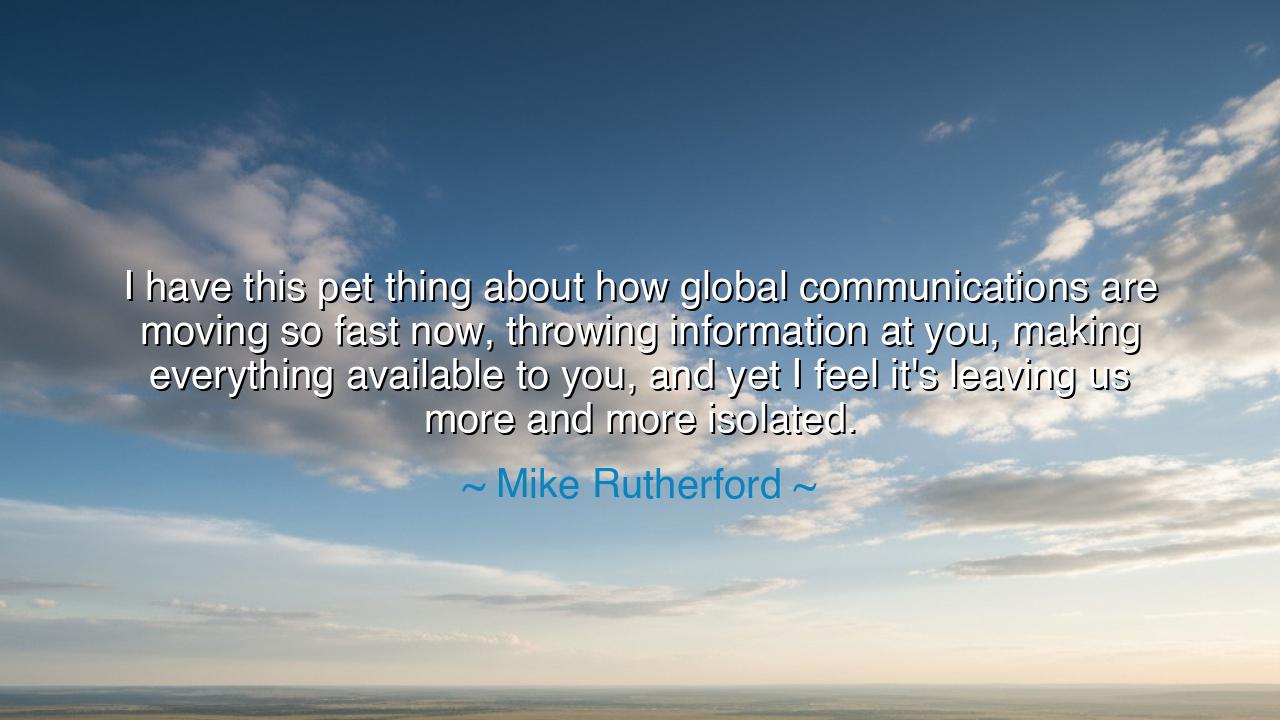
I have this pet thing about how global communications are moving
I have this pet thing about how global communications are moving so fast now, throwing information at you, making everything available to you, and yet I feel it's leaving us more and more isolated.






Hear the voice of Mike Rutherford, who observed with both awe and sorrow: “I have this pet thing about how global communications are moving so fast now, throwing information at you, making everything available to you, and yet I feel it’s leaving us more and more isolated.” These words are not merely complaint, but prophecy. For they speak of the paradox of our age: that the faster our voices travel across the earth, the less our hearts seem to touch.
At the heart of this reflection lies the tension between connection and isolation. The tools of modern life—swift messages, endless feeds, ceaseless alerts—promise to bind us closer, to dissolve distance, to make the world itself a village. And yet, the human soul is not built only for speed, nor for abundance of information. It longs for depth, for presence, for the gaze of the other across the table. When messages multiply but meanings thin, the heart begins to starve amidst plenty, like a man drowning in the very waters he sought to drink.
The ancients knew well the danger of excess without depth. In the Roman Empire, as roads and messengers bound provinces together, voices traveled swiftly, but corruption spread just as quickly, and communities weakened beneath the flood of rumors and decrees. So too in our day: the roads are now invisible wires and waves of light, but the peril is the same. When all things are made instantly available, the soul may forget how to dwell in silence, how to savor, how to be nourished by one thing well understood.
Consider the story of the telegraph, the first tool to make voices travel faster than the body could move. When it was invented, many hailed it as the unifier of nations, yet some feared it would flood the mind with noise. They were not wrong. The telegraph changed wars, politics, and commerce, but it also made the world restless. Today, Rutherford speaks of that same restlessness magnified a thousandfold: a world where availability has become abundance, and abundance has become alienation.
Yet his lament is not without hope. For in the very act of naming the problem—of calling out this isolation—he reminds us that we are not powerless. To see the wound is the first step toward healing. And the healing lies not in rejecting communication, but in remembering that technology is a servant, not a master. The flood of voices must not drown the voice of the neighbor beside us. The screen must not replace the hand we can hold.
The teaching is clear: seek balance. Use the gifts of global communication, but do not let them hollow you out. Let them be bridges, not cages; let them carry truth, not only noise. Step away from the whirlwind of endless information and step into the stillness of genuine presence. For true connection is not measured in speed or in quantity, but in the depth of understanding and the warmth of love.
The lesson for us is this: guard your heart against the illusion of closeness. Thousands of voices may cry out to you from the glowing glass, yet leave you lonely. One true friend at your side, one honest conversation, one quiet meal shared—these are worth more than all the messages of the world. To live fully, you must choose depth over distraction, presence over pretense, being over endless scrolling.
So let your action be this: each day, turn from the flood for a time. Put aside the screens, still the constant flow, and look into the eyes of one who walks beside you. Speak slowly, listen deeply, and remember that the soul is not made for endless speed, but for eternal connection. In doing this, you shall transform isolation into belonging, and make of this fast-moving world not a storm of noise, but a chorus of voices in harmony.






AAdministratorAdministrator
Welcome, honored guests. Please leave a comment, we will respond soon